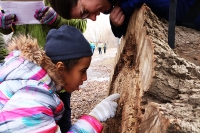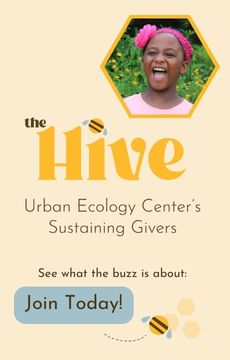It was one of those freakishly warm days in February when the temperatures rose into the low 70s. I was working with a group of excited, but respectful, 2nd graders from Franklin Pierce Elementary. We were focusing on one of the most important of nature’s resources, soil. Inside we learned how the FBI (fungus, bacteria, and invertebrates) change sticks, leaves and other organic material into soil. Then we headed outside for some exploring.
We made our way in the warm sun to a multitude of dirt piles we use for adding soil to our park. Each student was given a spade as their scientific instrument. Soon the students were digging in the dirt more enthusiastically than a dog digging for a bone, looking for those FBI. It did not matter that they were not finding anything right away. Just having this tool in their hands was enough for them. Soon though we made our first find, ancient rocks (gravel) that we decided could be a meteorite! There’s nothing like a little imagination to spark the curiosity of young scientists. Suddenly one of the students yelled, “I got a worm! I got a worm!” With mud-coated hands the student proudly showed his find.
All the students flocked to the spot quicker than crows mobbing an owl. They all couldn’t wait to dig in that exact same spot. I explained that there are many worms out there and if we all dug in the same spot someone was going to end up with a face full of dirt. We continued our digging in different spots. Worm after worm, meteorite after meteorite, we kept exploring. Their excitement could not be contained.
The students dug and dug all morning long until we had to give up our spot to the other half of the class that was exploring the park. We could have spent all of our time there, no doubt.
As I listened to the stories of discoveries made, reflected on how all of this excitement came from just from digging in the soil. Just giving students the chance to dig and use a tool was enough for them to puzzle out what can be discovered in nature. How simple, how engaging, and how amazing nature is when you just get out there and play, as well as get a bit dirty!
The teacher could not have been more pleased with his students and all the things they discovered that day. I also learned something; it is not the fancy vocabulary students learn while here or the concepts we think children should know that builds a land ethic. It is the chance to explore without worry and to get their hands a bit dirty while connecting with our planet.





